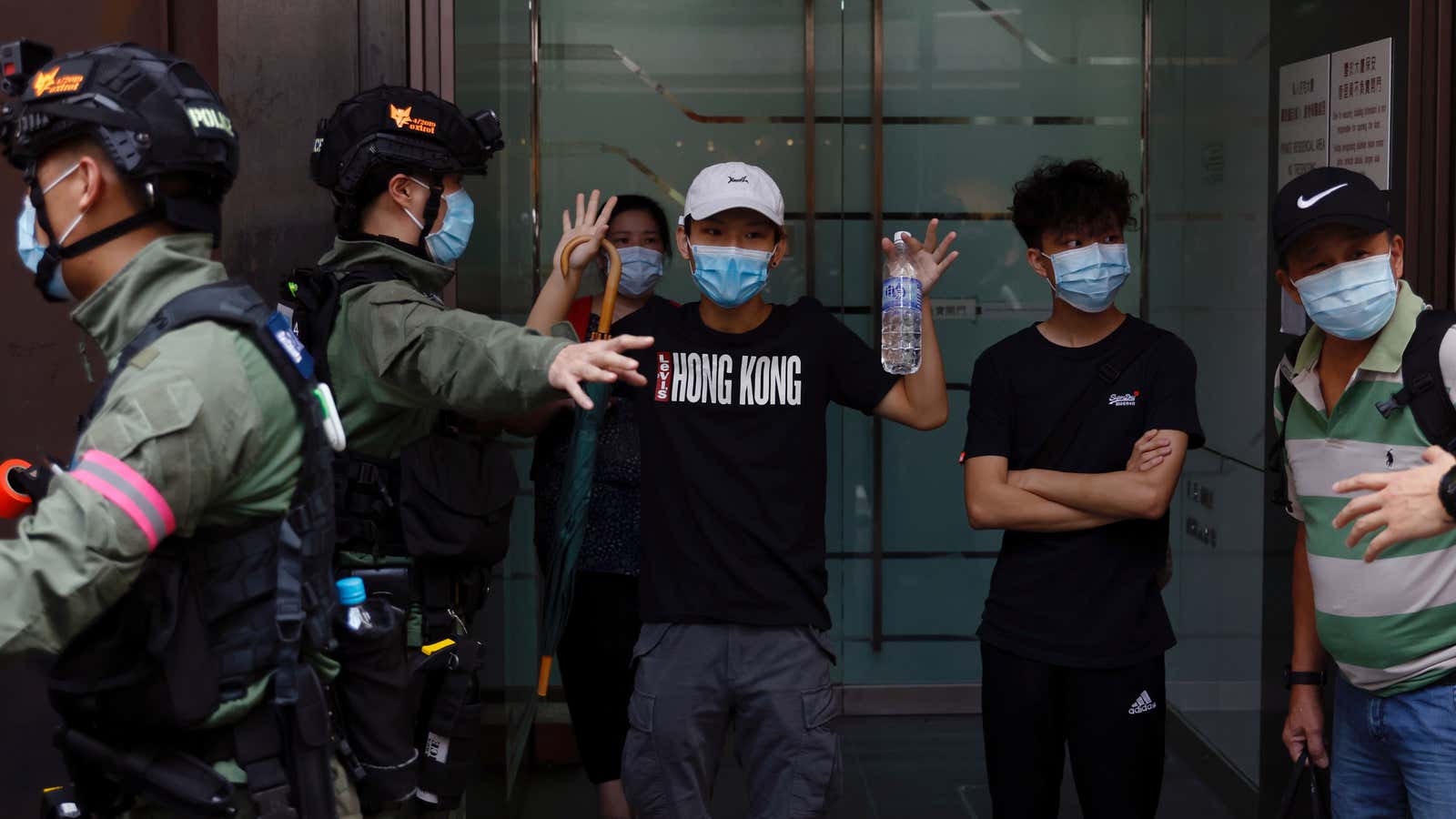When chanting slogans counts as sedition, tweeting counts as foreign collusion, placing ads in foreign publications counts as secession, and surveying electoral opinion counts as subversion, it’s clear that the bar for being a dissident in Hong Kong is precipitously falling.
Hong Kong today woke up to yet another morning of mass arrests of democracy activists—the biggest such round-up yet under its new national security law—as police fanned out across the city to detain dozens on suspicion of subversion, a vaguely defined crime punishable by up to life in prison.
According to local media (link in Chinese), more than 50 individuals affiliated with the opposition camp, including former and current elected politicians, have been arrested.
At a press briefing, Steve Li, a senior superintendent in the police force’s national security unit, said over 1,000 officers had been deployed in the day’s operation, with 53 arrested so far and 72 premises searched. He said that those arrested attempted to use “strategic voting” to win a majority in the legislature and “handicap” the government. Li is among roughly a dozen officials placed under sanctions by the US for their roles in dismantling the Hong Kong’s autonomy and freedoms.
Local news reports and social media posts, including from the Hong Kong Democratic Party, suggest that the detentions are related to an unofficial opposition “primary” held last June. After the democratic camps swept local polls in November 2019 thanks to a unified effort, the opposition camp saw the primary exercise as a way to get a read on the best candidates to field in order to make similar gains in legislative elections that were due last September. Over 600,000 voters participated, but the government quickly decried the effort as illegal. The government later “postponed” the elections, citing the pandemic.
Also reported to be among those detained was American citizen John Clancey, a lawyer who served as a treasurer for a pro-democracy coalition that coordinated the opposition primaries.
The arrests smack of China’s tactics of detaining dissidents, lawyers, and activists en masse as a way of quashing dissent and terrorizing citizens into silent acquiescence. It also reaffirms widespread fears that China-style repression, be it through authoritarian government rhetoric or undermining courts and judges, will increasingly be the norm in Hong Kong under a law that authorities once claimed would only affect “a tiny number.”
Today’s developments fit a broader pattern of a government campaign, directed by China, to extinguish all political opposition and engineer a complete takeover of the legislative branch. After years of disqualifying popularly elected politicians on dubious legal grounds, authorities this year moved more decisively to bar opposition candidates from running in elections. But it didn’t stop there. Beijing then moved to disqualify four opposition lawmakers, which triggered the mass resignation of the entire opposition camp. Even with the legislature now rendered a rubber stamp, China is evidently taking no chances as it rounds up anyone who has tried to contest in an election—or might if elections ever return.
In a statement posted on Twitter, the exiled activist Nathan Law called on the European Parliament to block approval of a major EU-China investment deal in response to the crackdown in Hong Kong. The deal has moved forward in recent weeks even though the the incoming Biden administration has expressed hope of a more coordinate approach with Europe on dealings with China over human rights or other issues. Antony Blinken, likely to be US secretary of state in the incoming Biden administration, called the arrests an “assault” and signaled support for Hong Kong’s activists.
This story has been updated to include comments from the police, and to clarify that Robert Chung, an academic who heads an independent polling institute that helped run the primaries, was not among those arrested.
